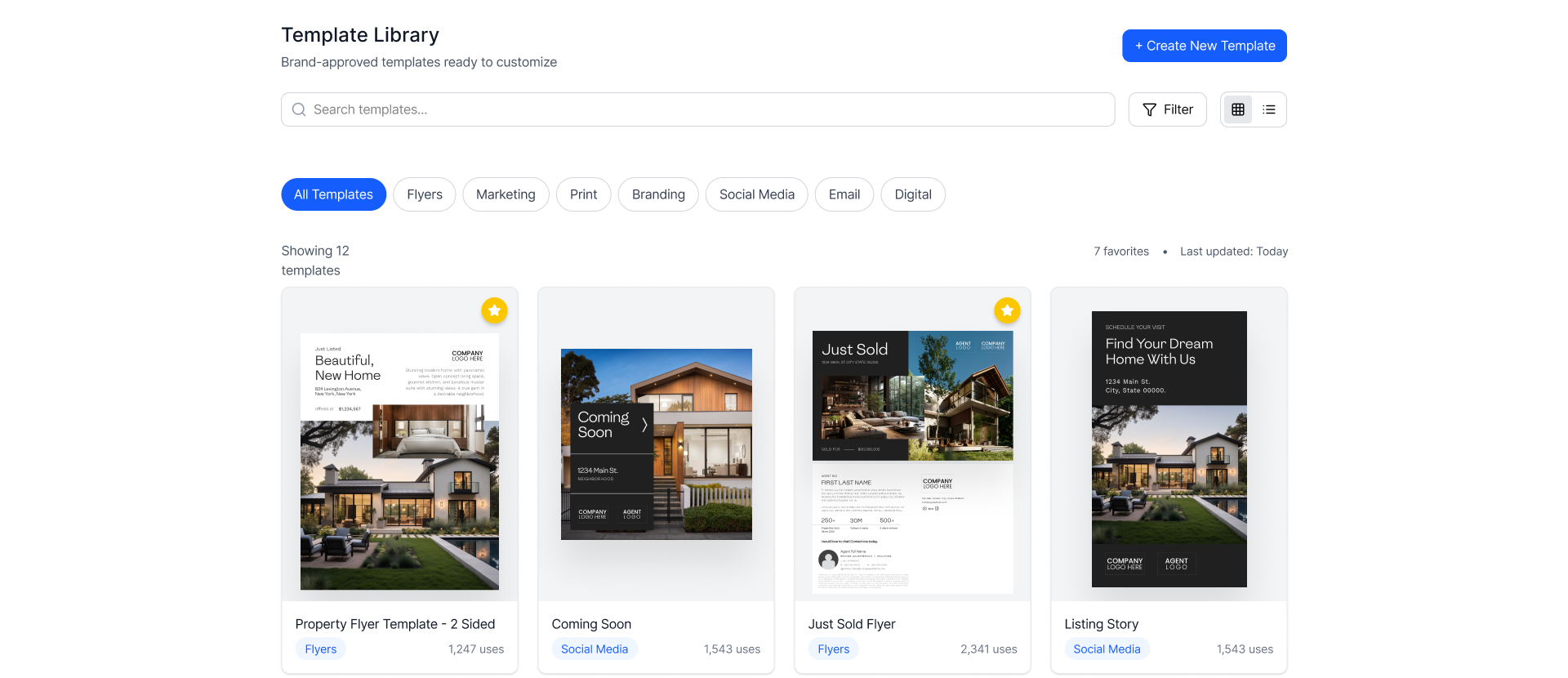The best realtors know the ins and outs of their market. They take the time to understand their region and learn what their potential clients are looking for and what properties they want to get.
Today, even the most successful agents understand that a deep understanding of the market is not enough. To truly stand out, you need a robust real estate marketing plan. This plan provides a framework for your marketing efforts, guiding you toward your goals in the ever-evolving real estate landscape.
With that in mind, let’s look at what a real estate marketing plan is and how you can create a sound strategy that will help you achieve your goals.
What Is a Real Estate Marketing Plan and Why You Need One
A real estate marketing plan is a document that details your overall business strategy. It contains audience demographics, key market data, your budget, and the KPIs you want to follow.
Many realtors focus on legacy tactics that involve various real estate marketing materials. This is crucial, but they aren’t as powerful as they were unless you have a strategy for using them, and that’s precisely where a marketing plan will help.
A sound real estate marketing plan will help you:
- Determine your exact marketing campaign goals
- Gain more data on your target audience
- Decide what the right amount of resources is needed
- Select the most effective marketing strategies
The 7-Step Formula for a Successful Marketing Plan in Real Estate
A sound real estate marketing plan is not a small thing you need to create. It involves a lot of information and many steps. To simplify this, we have a straightforward 7-step formula that will help you break this endeavor into meaningful chunks. This will further help you successfully develop each one and form a unified marketing plan.
Without wasting any time, let’s begin with the steps.
Define a Profitable Target Audience

Defining a profitable target audience is the first step you need to take because a marketing plan won’t work without clear definitions of your audience. Even though it might sound to some like this part is easy and not among the top marketing headaches, it needs to be done with great care.
You need to consider various factors to determine your ideal customer, including:
- Basic demographics like age and gender
- Behavior patterns
- Wants and needs
- Pain points
- Buying habits
A big part of this should be the geographical data because you need to define the specific areas or neighborhoods you want to target.
Additionally, you should define your niche market as well, especially if your real estate business focuses on a specific niche market, like luxury homes or investment properties.
Analyze Your Competitors

Understanding what your competition is doing is crucial in developing a winning real estate marketing strategy. It’s not about copying them but understanding who you’re trying to surpass. You need to know what they’re doing wrong and what they’re doing right, as it will help you differentiate yourself from the crowd.
First, you need to analyze the market to identify your key competitors. Even if you already know who they are, it’s good to find as many as possible.
After that, you need to analyze their online presence by checking their:
- Website
- Social media presence
- Online reviews
- Advertising efforts
For example, you can read their advertising in detail to determine what offers they use and what place in the market they’re trying to occupy. Keyword research can also be helpful because it will determine the terms they are trying to rank for and the messages they’re trying to convey to their audience.
All this will help you assess their online marketing efforts to find their strengths and weaknesses.
If you want to do it in detail, it’s good to do a SWOT analysis for each major competitor, where you focus on analyzing their strengths, weaknesses, opportunities, and threats.
Highlight Your Unique Value Proposition

In a competitive market like real estate, it’s crucial to clearly define and articulate your unique value proposition (UVP). A clear and concise UVP will separate you from the competition further.
The UVP needs to be a concise statement to identify your strengths, so you need to reflect on your skills, expertise areas, and experience. However, you should also focus on what your audience wants by asking yourself questions like what problems they face and how you can solve them.
When you know this, you need to concisely articulate the benefits you offer in a way that will best fulfill those needs. The message needs to be clear and short, and there’s no need for jargon or unrealistic promises. You also shouldn’t oversell yourself but focus on how to solve your audience's pains.
Once you have your UVP, you can work on incorporating it into your marketing materials, which should include an email newsletter as well, one of the biggest marketing tools many in real estate are failing to take advantage of.
Craft a Clear and Compelling Marketing Message

The marketing message you’re trying to convey should be at the center of your communication efforts. It shows how you aim to connect with your audience and how you want to win them over. Just as it goes for your UVP, the message should be concise and clear, but it should also be compelling, so it can resonate with the audience and get them to work with you.
You need to hit your audience on the emotional level, which is why it’s so important to speak directly to their pain points and needs.
You should use powerful language for this by focusing on strong verbs and evocative adjectives. You need to focus on words and phrases that evoke expertise, trust, and value. This includes phrases like seamless experience, expert guidance, or trusted advisor.
A marketing message should have a clear call to action (CTA) that will make it seem very easy for the audience to take the next step with you.
The key here is to try different things and continuously test how each attempt works. This will help you refine your message and pinpoint the clear winner.
Set a Realistic Marketing Budget

As you’ve seen already, a big part of a marketing plan for real estate brokerages and agents is outlining a clear and, more importantly, realistic marketing budget. It must be well-defined to ensure efforts are effective and sustainable. This will ensure you don’t over or underspend.
To set a realistic marketing budget, you first need to determine your overall marketing goals. Circle back to your overall goals to ensure you can fit all of that within the budget you have in mind.
You need to research the costs of the exact tactics you wish to use and how much each one will cost, which is the most significant part of this segment of the plan. Moreover, you need to:
- Factor in the time and resources that go with each marketing activity.
- Consider your overall revenues and expenses so you can fit your marketing budget within those parameters.
- Create a contingency fund that will include enough money for unexpected expenses or opportunities you might run into during the implementation of your plan.
Select the Most Effective Marketing Channels

As you probably already know, there are many marketing channels on which you can run your campaigns. However, you don’t have to use each one, nor should you use each one. You need to find the ones that are the most effective for you, which will depend on your target audience and specific goals.
- When it comes to your target audience, you need to check where they spend time and which social media platforms they are most likely to interact with. However, you shouldn’t forget content marketing, email marketing, and your real estate listings, as all of these are their own marketing channels.
- As for the goals, you need to ensure the channels and goals align. In essence, you need to research which channels are best suited for achieving your goals.
Naturally, you’ll also need to ensure the channels and what you’ll do on them fits within your budget. Since, in most cases, this leads to higher than anticipated costs, you need to try to make adjustments that will save costs, but only in areas that won’t significantly impact the effectiveness of your marketing.
Lastly, it’s advisable to use a mix of offline and online channels because your audience is certainly on both.
Measure and Optimize Your Performance

Marketing campaigns cannot be put into action and simply left alone — you need to constantly measure their performance. Every campaign is fluid, and no matter how effective, it doesn’t mean it will work continuously without any changes.
To optimize the performance of your strategies, you need to follow the right metrics that will help you determine its effectiveness, including:
- Website traffic numbers and bounce rate
- Email open rates and click-through rates
- Return on investment
- Lead generation and conversion rate
- Cost per lead
- Social media engagement metrics like likes, comments, and shares
The best way to follow these is to use an analytics tool like Google Analytics.
You can also set a reporting schedule, which will make it easier to regularly analyze data. This analysis is crucial as it will help you determine how to optimize your strategies. In the majority of cases, you’ll likely focus on one or more of the following:
- Further website optimization for search engines
- Adjusting paid advertising campaigns
- Refining social media targeting
- Email optimization by improving subject lines and content
Continuously Improve Your Marketing Plan

If you’re here to learn how to create a real estate marketing plan that works, you also need to understand that you need to continue improving it even after its creation and implementation. That includes the following:
- Review your goals and objectives regularly to ensure they are following the latest market conditions and that they remain relevant to your current business priorities.
- Analyze performance data in detail. Make informed decisions based on the data, like your KPIs, and keep looking for what works and what doesn’t.
- Keep following industry trends through blogs but also by networking and attending webinars. Ensure you incorporate these trends into your plan to keep it optimized.
- Get feedback from your clients and leads to see what they think and read social media comments and online reviews about your business.
- Don’t be afraid to experiment with new strategies like new marketing channels, tactics, and technologies whenever you feel there’s room for it.
- Continuously refine your target audience because your ideal customer will likely change over time.
- Remember to keep documenting your process. In other words, create a system for keeping track of the strategies you’re using and their results.
Final Thoughts
Crafting a powerful real estate marketing plan is crucial in any marketing campaign as it will help you stay organized, set and follow clear marketing goals, allocate the right amount of resources, and use the most effective marketing strategies.
With our step-by-step explanation on how to create a real estate marketing plan, you’ll be well on your way to preparing one that will not only work but also get you to fully stand out of the crowd and become the go-to real estate leader you aim to be.
Naturally, you don’t have to struggle with all of this on your own, and you can always book a demo for Maxa, the ultimate marketing and design tool for realtors, to see how we can help you and your business.











